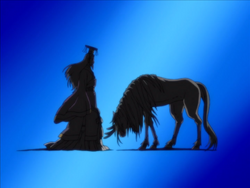Ou (王, ruler/king) refers to the monarch of a kingdom, the highest ranking individual of a particular kingdom. Only twelve individuals at most can hold the rank, one for each country in the Twelve Kingdoms.
Overview[]

A kirin choosing its ruler
A ruler of a kingdom is chosen by the kirin born for the kingdom rather than by blood or familial relationships. As a result, there have been no cases where a monarch has possessed the same surname as the preceding ruler. It is believed that Tentei selects the individual and the kirin serves as Tentei's divine intermediary in finding a kingdom's new ruler. The kirin recognizes the monarch through a quality known as ouki, a unique and undefinable aura that allows the kirin to simply know when a person is the kingdom's ruler. After a kirin finds its ruler, it will form a pact with the individual, which effectively ends the person's existence as a ordinary person and transforms the individual into an immortal being to serve as the kingdom's ruler.
A monarch cannot die by ordinary means and so long as the ruler obeys the Mandate of Heaven received upon ascending the kingdom's throne, they will remain alive. Because of the Mandate of Heaven, a ruler cannot deny the responsibility of governing; by abdicating the throne, a monarch must also forfeit their own life in order to end a reign.
Typically, a ruler with a long and stable reign will have a prosperous and thriving kingdom, while short-lived monarchs tend to leave their kingdoms in a state of turmoil. The ascension of a new monarch is usually viewed by a kingdom's citizens as an auspicious sign because a ruler sitting upon the kingdom's throne is initially sufficient to quell trouble such as drastic weather changes and the presence of wild youma.
Monarchs are not allowed to marry formally or have children. If he or she was married previous to his or her ascension to throne, their formal marriage becomes a common-law marriage. Whereas common citizens raise children as a way to serve the heavens, rulers serve the heavens by ruling their nations properly.
Names[]
The twelve rulers are often referred to by the kokushi (国氏, kingdom clan-name), a kanji character serving as the ruler's forename (the formula being "forename + -王"). The kanji character is homophonous to the kingdom's name, but is an entirely different character with a different meaning from the kingdom's name.[1]
The kokushi is inscribed on the royal seal of a monarch, which is regarded as one of a kingdom's royal treasures. Upon the ruler's death, the seal with the kokushi will smooth over completely so it is blank until the next ruler is chosen. In rare cases, the kokushi can change to another character, though known instances of a kingdom's kokushi changing were an indication from the heavens that a grievious trangression had been committed by the monarch of a kingdom.
The prefix kanji used for the "-ou" titles of the rulers of the Twelve Kingdoms is the same as that used to prefix their kirin's "-ki" and "-rin" names.
| Kingdom | Kingdom's kanji | Kokushi |
|---|---|---|
| En | 雁 | 延 |
| Han | 範 | 氾 |
| Hou | 芳 | 峯 |
| Kei | 慶 | 景 |
| Kou | 巧 | 塙 |
| Kyou | 恭 | 供 |
| Ren | 漣 | 廉 |
| Ryuu | 柳 | 劉 |
| Sai | 才 | 采 斎 (previously)[2] |
| Shun | 舜 | 徇 |
| Sou | 奏 | 宗 |
| Tai | 戴 | 泰 代 (previously)[3] |
Notes on Translation[]
The term for Ou (王) is a gender neutral term in Japanese, meaning it can equally refer to a male or female ruler. In English, it usually translated as ruler, royal or king, referring to a single monarch. Because "king" has connotations that the ruler specified is male, various different translations have been employed in cases to indicate the ruler is female. Other translations use a single term for Ou (王) to refer to the ruler, regardless of possible connotations.